情态动词要点归纳1-30
情态动词总结
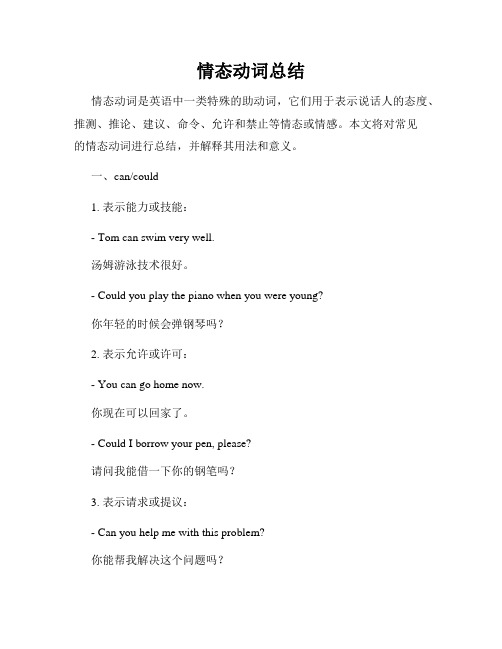
情态动词总结情态动词是英语中一类特殊的助动词,它们用于表示说话人的态度、推测、推论、建议、命令、允许和禁止等情态或情感。
本文将对常见的情态动词进行总结,并解释其用法和意义。
一、can/could1. 表示能力或技能:- Tom can swim very well.汤姆游泳技术很好。
- Could you play the piano when you were young?你年轻的时候会弹钢琴吗?2. 表示允许或许可:- You can go home now.你现在可以回家了。
- Could I borrow your pen, please?请问我能借一下你的钢笔吗?3. 表示请求或提议:- Can you help me with this problem?你能帮我解决这个问题吗?- Could we have lunch together tomorrow?明天我们一起吃午饭好吗?4. 表示推测或猜测:- It can't be true! I don't believe it.这不可能是真的!我不相信。
- They could be at the park. Let's check there.他们可能在公园。
我们去看看吧。
二、may/might1. 表示允许或许可:- May I use your phone?我可以用你的手机吗?- Might I have another piece of cake?我可以再要一块蛋糕吗?2. 表示请求或建议:- May I ask you a question?我可以问你一个问题吗?- You may consider taking a break.你可以考虑休息一下。
3. 表示推测或猜测:- She may be late for the meeting.她可能会迟到开会。
- It might rain tomorrow, so bring an umbrella.明天可能会下雨,所以带把伞吧。
情态动词复习要点

情态动词复习要点一、can/could和may/might表示“许可”1. 两者都可以表示许可,常可互换。
如:Can(May)I borrow your knife?我可以借你的刀子吗?The teacher says we can(may)leave early tomorrow. 老师说我们明天可以早一点走。
2.表示请求许可时,用could/might 比用can/ might更委婉。
但肯定回答时要用can或may。
---Could(Might)I stay in your office? 我可以呆在你的办公室吗?--- Of course, you can(may). 当然可以。
3. 表示“禁止,不允许”时用must not(mustn’t)。
You mustn’t climb the tree. It’s dangerous. 你不能爬树,那危险。
二、can, could和be able to表示“能力”1. 在现在时中can, be able to可互换。
如:I can(am able to) write some English words now. 我现在会写一些英语单词了。
2. be able to还可用于将来时和完成时。
如:He will be able to see you tomorrow.他明天去拜访你。
I have been able to go to work for a week. 我已经上班一周了。
3. 在过去时中,could表示泛指的能力,was/were able to表示过去特定的某一次能力。
如:She could swim when she was ten. 她十岁时就会游泳了。
Only thirty people in the building were able to escape after the fire broke out. 大火爆发后只有三十人从大楼里逃了出来。
情态动词用法归纳(全)(1)
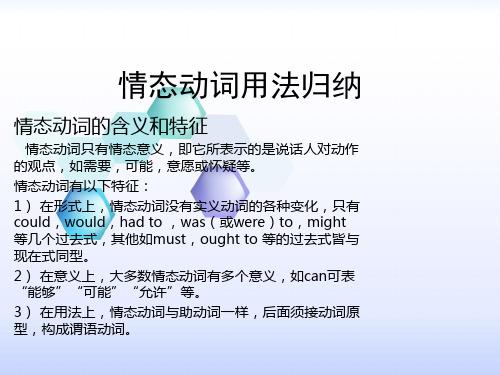
2) need 作情态动词用时, 常用于疑问句、否定句。在肯定句 中一般用must, have to, ought to, should代替。
1.You needn’t come so early. 2. ---- Need I finish the work today?
---- Yes, you must. / No, you needn’t.
may(might)有以下几种形式:
时态 现在式 过去式
肯定式 may might
否定式 缩略否定式
may not
mayn't
might not mightn't
may(might)的基本用法:
1)表可能,暗含不确定,等于possibly,perhaps,maybe,如: He may be busy getting ready for his trip. 他也许在忙于准备外出旅游。
You might ask before you borrow my car. 你可以先问问我再借我的车子嘛。
you might have helped me. 你完全可以帮我一把的呀。
4)May 与might的比较:
might 可表虚拟语气,may则不可以,如: It might help a little if you would only keep clean .
He should do some work,but he doesn't want to 他应该做些工作,但是他不想做。
4)表推测,暗含很大的可能,如:
The film should be very good as it is starring first-class actors. 这部电影是一流的演员主演的,可能拍得很好。
情态动词用法归纳总结
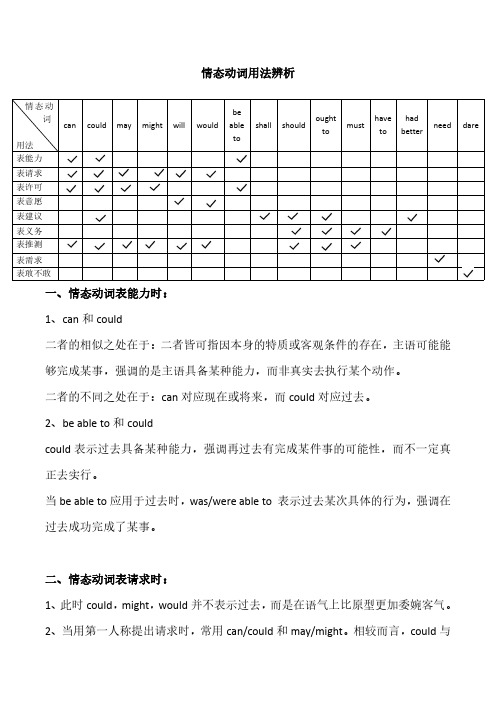
情态动词用法辨析情态动词用法can could may might will would be able to shall should ought to must have to had better need dare表能力表请求表许可表意愿表建议表义务表推测表需求表敢不敢一、情态动词表能力时:1、can 和could二者的相似之处在于:二者皆可指因本身的特质或客观条件的存在,主语可能能够完成某事,强调的是主语具备某种能力,而非真实去执行某个动作。
二者的不同之处在于:can 对应现在或将来,而could 对应过去。
2、be able to 和couldcould 表示过去具备某种能力,强调再过去有完成某件事的可能性,而不一定真正去实行。
当be able to 应用于过去时,was/were able to 表示过去某次具体的行为,强调在过去成功完成了某事。
二、情态动词表请求时:1、此时could ,might ,would 并不表示过去,而是在语气上比原型更加委婉客气。
2、当用第一人称提出请求时,常用can/could 和may/might 。
相较而言,could 与may在表请求的问句中出现的频率最高;might表发请求的语气最为委婉客气,因此反而很少见;而can则常用于熟人间的对话中。
语气强度:can>could/might>might3、当用第二人称提出请求时,常用can/could和will/would。
其中could和would 表达请求的语气更委婉客气;而can与will则常用于熟人对话中。
语气强度:can/will>could/would三、情态动词表许可时:1、与表请求不同,will/would不论前接第几人称,都表示主语本身的意愿,无需得到他人的“许可”,所以will/would不可以用于表请求的句中。
2、can和may二者都可以表示对现在或将来动作的许可,其中can的使用频率更高。
情态动词的用法总结归纳表
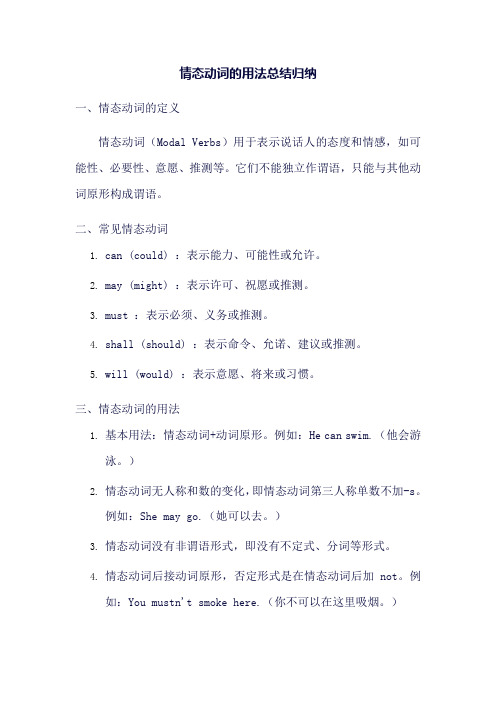
情态动词的用法总结归纳一、情态动词的定义情态动词(Modal Verbs)用于表示说话人的态度和情感,如可能性、必要性、意愿、推测等。
它们不能独立作谓语,只能与其他动词原形构成谓语。
二、常见情态动词1.can (could) :表示能力、可能性或允许。
2.may (might) :表示许可、祝愿或推测。
3.must :表示必须、义务或推测。
4.shall (should) :表示命令、允诺、建议或推测。
5.will (would) :表示意愿、将来或习惯。
三、情态动词的用法1.基本用法:情态动词+动词原形。
例如:He can swim.(他会游泳。
)2.情态动词无人称和数的变化,即情态动词第三人称单数不加-s。
例如:She may go.(她可以去。
)3.情态动词没有非谓语形式,即没有不定式、分词等形式。
4.情态动词后接动词原形,否定形式是在情态动词后加not。
例如:You mustn't smoke here.(你不可以在这里吸烟。
)5.带有情态动词的疑问句和否定句变换只需将情态动词提到主语前或直接在情态动词后加not。
例如:Can he dance?(他会跳舞吗?)He can't dance.(他不会跳舞。
)6.情态动词可以表示推测和可能性。
例如:It may rain tomorrow.(明天可能会下雨。
)7.情态动词可以表示命令和建议。
例如:You should study hard.(你应该努力学习。
)8.情态动词可以表示习惯和规律。
例如:He will arrive at nine.(他将在九点到达。
)9.情态动词可以与完成时连用,表示对过去的推测和猜测。
例如:She may have gone to the cinema.(她可能去看电影了。
)10.情态动词可以与进行时连用,表示对现在的推测和猜测。
例如:He must be studying in the classroom.(他一定在教室里学习。
情态动词用法归纳(全)
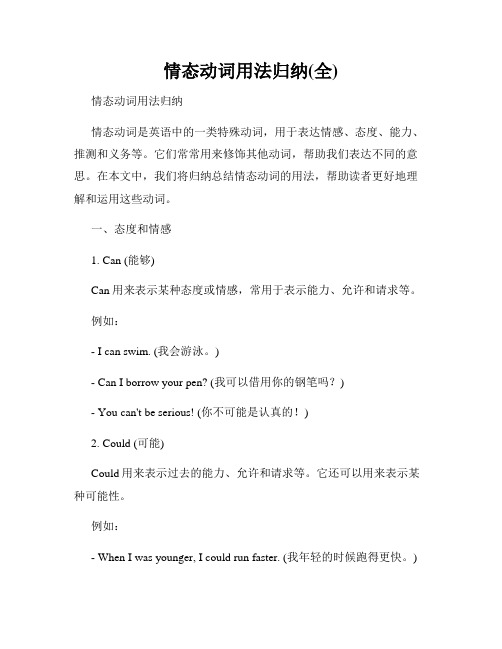
情态动词用法归纳(全)情态动词用法归纳情态动词是英语中的一类特殊动词,用于表达情感、态度、能力、推测和义务等。
它们常常用来修饰其他动词,帮助我们表达不同的意思。
在本文中,我们将归纳总结情态动词的用法,帮助读者更好地理解和运用这些动词。
一、态度和情感1. Can (能够)Can用来表示某种态度或情感,常用于表示能力、允许和请求等。
例如:- I can swim. (我会游泳。
)- Can I borrow your pen? (我可以借用你的钢笔吗?)- You can't be serious! (你不可能是认真的!)2. Could (可能)Could用来表示过去的能力、允许和请求等。
它还可以用来表示某种可能性。
例如:- When I was younger, I could run faster. (我年轻的时候跑得更快。
)- Could I ask you a question? (我可以问你一个问题吗?)- It could rain later, so bring an umbrella. (今天后面可能会下雨,所以带上雨伞。
)3. May (可能)May常表示许可、请求和推测等。
它还可以用来表示某种可能性或希望。
例如:- May I use your phone? (我可以用一下你的手机吗?)- It may rain tomorrow. (明天可能会下雨。
)- They may arrive late. (他们可能会迟到。
)4. Might (可能)Might与may的用法类似,但表示的可能性稍微低一些。
例如:- She might be busy. (她可能很忙。
)- I might go to the party, but I'm not sure yet. (我可能会去参加派对,但我还不确定。
)二、能力和推测1. Must (必须)Must用来表示强烈的推断或必要性。
情态动词主要用法总结
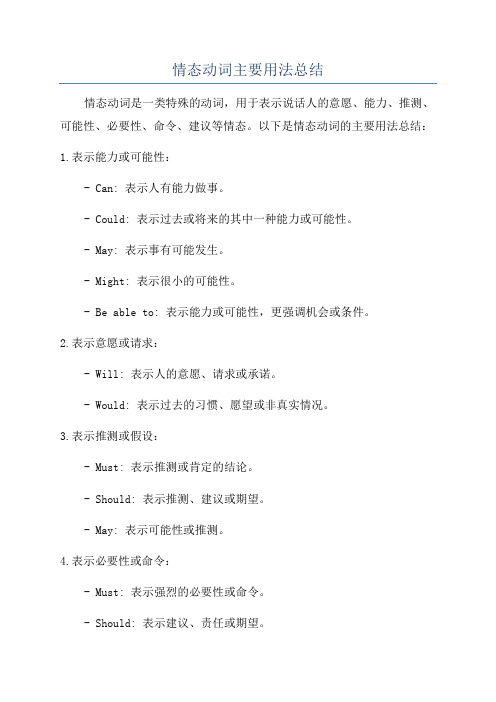
情态动词主要用法总结
情态动词是一类特殊的动词,用于表示说话人的意愿、能力、推测、可能性、必要性、命令、建议等情态。
以下是情态动词的主要用法总结:1.表示能力或可能性:
- Can: 表示人有能力做事。
- Could: 表示过去或将来的其中一种能力或可能性。
- May: 表示事有可能发生。
- Might: 表示很小的可能性。
- Be able to: 表示能力或可能性,更强调机会或条件。
2.表示意愿或请求:
- Will: 表示人的意愿、请求或承诺。
- Would: 表示过去的习惯、愿望或非真实情况。
3.表示推测或假设:
- Must: 表示推测或肯定的结论。
- Should: 表示推测、建议或期望。
- May: 表示可能性或推测。
4.表示必要性或命令:
- Must: 表示强烈的必要性或命令。
- Should: 表示建议、责任或期望。
- Have to: 表示客观上的必要性。
5.表示允许或禁止:
- Can: 表示人被允许做事。
- May: 表示人有许可或请求。
- Must not: 表示禁止做事。
6.表示习惯、忠告或规定:
- Should: 表示习惯、忠告或规定。
- Ought to: 表示强烈的建议或道义上的责任。
情态动词的用法具有一定的灵活性,其意义和用法还会受上下文的影响。
特别是在否定和疑问句中,情态动词的用法和意义可能会有所变化。
因此,对于情态动词的深入理解需要通过大量的阅读和实践来逐渐掌握。
情态动词总结知识点
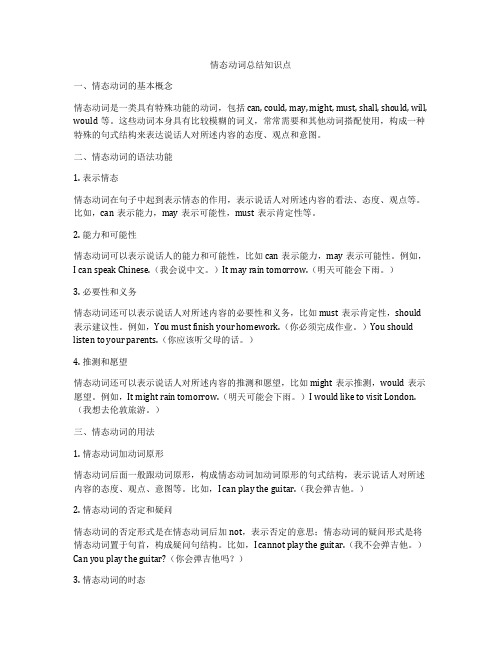
情态动词总结知识点一、情态动词的基本概念情态动词是一类具有特殊功能的动词,包括can, could, may, might, must, shall, should, will, would等。
这些动词本身具有比较模糊的词义,常常需要和其他动词搭配使用,构成一种特殊的句式结构来表达说话人对所述内容的态度、观点和意图。
二、情态动词的语法功能1. 表示情态情态动词在句子中起到表示情态的作用,表示说话人对所述内容的看法、态度、观点等。
比如,can表示能力,may表示可能性,must表示肯定性等。
2. 能力和可能性情态动词可以表示说话人的能力和可能性,比如can表示能力,may表示可能性。
例如,I can speak Chinese.(我会说中文。
)It may rain tomorrow.(明天可能会下雨。
)3. 必要性和义务情态动词还可以表示说话人对所述内容的必要性和义务,比如must表示肯定性,should 表示建议性。
例如,You must finish your homework.(你必须完成作业。
)You should listen to your parents.(你应该听父母的话。
)4. 推测和愿望情态动词还可以表示说话人对所述内容的推测和愿望,比如might表示推测,would表示愿望。
例如,It might rain tomorrow.(明天可能会下雨。
)I would like to visit London.(我想去伦敦旅游。
)三、情态动词的用法1. 情态动词加动词原形情态动词后面一般跟动词原形,构成情态动词加动词原形的句式结构,表示说话人对所述内容的态度、观点、意图等。
比如,I can play the guitar.(我会弹吉他。
)2. 情态动词的否定和疑问情态动词的否定形式是在情态动词后加not,表示否定的意思;情态动词的疑问形式是将情态动词置于句首,构成疑问句结构。
比如,I cannot play the guitar.(我不会弹吉他。
- 1、下载文档前请自行甄别文档内容的完整性,平台不提供额外的编辑、内容补充、找答案等附加服务。
- 2、"仅部分预览"的文档,不可在线预览部分如存在完整性等问题,可反馈申请退款(可完整预览的文档不适用该条件!)。
- 3、如文档侵犯您的权益,请联系客服反馈,我们会尽快为您处理(人工客服工作时间:9:00-18:30)。
must a). 必须,应该, 表示说话人认为有必要做 某事(否定回答用 needn‟t, don‟t have to)
---Must we hand in our English exercise books? ---Yes, you must.
( No, you don‟t have to.)
You shouldn‟t have helped him, he could do it himself.
would have done 表示过去会做 什么,而没有做。 I thought he would have told you about it.
may have done 表示对过去某事作可 能性推测.
mustn’t “不得/不可以做某事” You mustn’t tell George. =Don’t tell George.
don’t have to=needn’t “不必要…” You don’t have to/needn’t tell George.
would 与 used to 过去常常
如果谈论过去某个时间设法做成某事 用was / were able to,而could没有此意。
Tom has started an exercise program. He was able to run two miles yesterday without stopping.
在否定句中,could与was/were able to 没有区别 Tom couldn’t run (wasn’t able to run)) five miles yesterday.
She didn‟t need to come to see me yesterday.昨天她不需来看我.(实际上没来看)
要注意needn„t have done与 didn't need to do的差别。
He needn't have come.
He didn‟t need to come. Eg: ----Mary didn‟t turn up last time, did she? ----No. She _________ . We had changed our plan.
注:1. may/might 在疑问句中表示请求 2.表示 “不可能 ”用can’t
A: Look! Someone is coming. Who can it be? B: It may be the headmaster. A:It can’t be him.He has gone abroad. B:It must be Mr.zhang. He looks exactly like the headmaster.
will用于主语是各人称的陈述 句中,表示“意愿、倾向”
a. ---The phone is ringing. I’ll get it. b. I will never do that again. (决心)
情态动词+ have +done
“ must + have + done” 表示对过去 的事情肯定的猜测,意思是 “一定 曾……”、 “准是……了”.如: Her father thought that she must have met an old friend. You must have finished your work.
b).对事物的推测,用于肯定句中,
否定用can‟t
--- He must be in the classroom.
---No, he can‟t be.
must & have to
must侧重于说话人的主观看法 have to侧重于客观上的需要,“不得不”
Mother: You must wipe your feet when you come in. Child: Do I have to wipe my feet every time I come in?
3. There was plenty of time. She _______. A. mustn’t have hurried B. couldn’t have hurried C. must not hurry D. √ needn’t have hurried
4.My English-Chinese dictionary has disappeared. Who ___ have taken it? C A.should B.must C.could 5.—Is John coming by train? D.would
modal verbs(情态动词)
Can
can表猜测,可能性(主要用于否定句,疑问 句或惊叹句) Can this be true?
This can‟t be done by him. How can you be so rude!
注意: could也表请求,语气婉转,主要用于疑 问句,不可用于肯定句,答语用can --Could I come to see you tomorrow? --Yes, you can. --( No, I’m afraid not.)
A. shouldn‟t have come
C. √ didn‟t need to come
B. needn‟t have to come
D. needn‟t have come
Should/ought to have done
过去该 做什么但没有做,意为 “早该…”, “本该…”(含有责 备的意思)。
May
表猜测,可能性
(主要用于肯定句和否定句中). might 更不肯定
He may be very busy now. Tom may not be eighteen. Peter ___come with us tonight, but he isn't very sure yet. A. must B. may C. can D. will
D 7.It has been announced that candidates _____ remain in their seats until all the paper have been collected.
A.can B.will C.may D.shall 8. I was really anxious about you. You ___ home B without a word.
can‟t have done 表示过去不可 能过了什么,语气也比较肯定 He can’t have gone to Beijing, for I had a talk with him just now.
needn‟t have done 表示过去没有 必要做什么但已经做了。意为: “本可不 必”.一般只用于否定句或疑问句. You needn‟t have come earlier. She needn‟t have come to see me yesterday. 昨天她本可不必来看我.(实际上来看了)
---He should, but he ____ not. He likes driving his D car. A.must B.can C.need D.may 6. —The room is so dirty._____ we clean it? B
--Of course.
A.Will B.Shall C.Would D.Do
用于陈述句。表示“命令”、“警告”、 “威胁”、“强制”、“允诺”等意思。
1). You shall fail if you don’t follow my advice. (警告) 2). He shall have the book when I finish reading. (允诺) 3). He shall be punished for what he has done. (威胁) You shall do as I say. 4). Tell him that he shall have the book tomorrow.
表示过去反复发生的动作或某种 倾向,但没有“现在无此习惯”的含义。 Used to表示过去的某种习惯,暗含 “现在不再”之意。 During the vacation he would visit me every week. My father used to smoke a lot.
You should have started earlier. She ought to have helped you a lot.
* 在这种结构中,ought to比should的口气更强烈, 强调职责和义务.
shouldn‟t have done
表 示过去不该做什么但做了。(含有 责备的意思)
A.mustn’t leave
B.shouldn’t have left
C.couldn’t have left D.needn’t leave 9.Oh, I’m feeling well in the stomach, I ____ so C much fried chicken just now. A.shouldn’t eat B.mustn’t have eaten D.mustn’t eat C.shouldn’t have eaten
Might have done 常用于虚拟语气,表 示对过去本来可能做而实际上没能 做某事的一种责备或遗憾.
1)You might have come earlier. (事 实上没来早)
练习:
1.We ________ last night, but we went to the concert instead. A. must have studied B. might study C. √ should have studied D. would study
